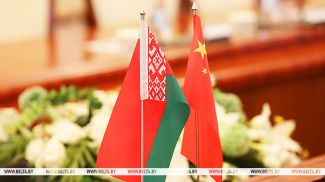Last week the European Parliament passed a resolution on the Belarusian nuclear power plant. Among other things the resolution calls for complete observance of international safety standards. The Nuclear and Radiation Safety Department of the Belarusian Emergencies Ministry (Gosatomnadzor) has commented on some matters relating to nuclear and radiation safety regulations.
First of all, Gosatomnadzor stressed that in the course of implementing its first nuclear energy program Belarus strictly follows safety standards of the International Atomic Energy Agency (IAEA) and fundamental safety principles. The country participates in the implementation of all components of the global nuclear safety regime. Belarus is a negotiating party to a number of conventions and agreements, including the Convention on Nuclear Safety and the Joint Convention on the Safety of Radioactive Waste Management and on the Safety of Spent Nuclear Fuel Management.
The Belarusian legislation on nuclear and radiation safety is constantly improved, including taking into account new requirements and recommendations of the International Atomic Energy Agency. New norms and rules are worked out. The existing documents get reworked, including high-level ones such as the law on nuclear energy usage and the law on radiation safety.
Belarus also broadly uses the tools offered by international evaluation missions and peer reviews. Belarus has voluntarily invited and hosted a number of International Atomic Energy Agency missions that focused on individual areas and the overall picture, including the evaluation of the regulatory infrastructure. Those were the International Atomic Energy Agency's Integrated Nuclear Infrastructure Review (INIR) missions in 2012 and 2020, Integrated Regulatory Review Service (IRRS) mission in 2016, Emergency Preparedness Review (EPREV) Service mission in 2018, and State Systems of Accounting for and Control of Nuclear Material (ISSAS) mission in 2019.
The recommendations Belarus received in the course of these missions are routinely implemented. The next mission – an International Physical Protection Advisory Service (IPPAS) mission – has been requested by Belarus and will take place in mid-2021. Belarus intends to welcome a post-mission of the IAEA's Integrated Regulatory Review Service (IRRS) in Q4 2021.
In official documents resulting from the missions the IAEA experts noted that Belarus had created an infrastructure to regulate nuclear and radiation safety and the country's solid adherence to the realization of nuclear and radiation safety principles had been demonstrated in the course of the mission (from the 2016 IRRS mission report). The 2020 INIR mission report reads that Belarus is close to completing the creation of the nuclear energy infrastructure, which is required to start operating the country's first nuclear power plant. The country has competent organizations and is finishing efforts to prepare the first unit for launch.
IAEA experts and other interested parties have repeatedly mentioned Belarus' positive practices and directions of successful work, which are recommended for studying to other countries, including with regard to the advancement of international cooperation, transparency and openness of the regulatory body. As an example Gosatomnadzor representatives noted that during the latest review meeting of the Convention on Nuclear Safety in 2017 the negotiating parties identified comprehensive international cooperation, including bilateral agreements on nuclear safety, as a direction of successful work in the resulting document. Negotiating parties of the Joint Convention on the Safety of Radioactive Waste Management and on the Safety of Spent Nuclear Fuel Management arrived at a similar conclusion during the latest review meeting in 2018.
Gosatomnadzor enjoys independence in making its regulatory decisions, including on such important matters as the licensing of usage of nuclear energy and sources of ionizing radiation.
Since October 2017 and prior to the launch of the first unit of the Belarusian nuclear power plant Gosatomnadzor arranged a comprehensive expert evaluation of the documents that justify the safe operation of the first unit. The evaluation was carried out by the energy and nuclear research institute Sosny of the National Academy of Sciences of Belarus. On the basis of the expert evaluation of the safety and the evaluation of the state enterprise Belarusian Nuclear Power Plant's conformance with requirements and conditions of the license, during which the readiness of the enterprise to perform the specified activities was checked, Gosatomnadzor prepared a conclusion on the possibility of granting the license to begin the physical launch of the Belarusian nuclear power plant's first unit.
The loading of nuclear fuel into the reactor of the first unit of the Belarusian nuclear power plant began after the operating enterprise was licensed to do it. Gosatomnadzor used its website to notify the public that the license had been granted. The International Atomic Energy Agency and competent authorities of the countries Belarus had signed the relevant bilateral agreements with were duly notified about the start of the nuclear fuel loading process.
Gosatomnadzor pointed out that the first unit of the Belarusian nuclear power plant will be commissioned in line with requirements of the national legislation and once the state enterprise Belarusian Nuclear Power Plant is licensed to do it. Prior to granting the license Gosatomnadzor will arrange public hearings according to the legally established procedure. In the course of these hearings the general public will be informed about the expert evaluations of the safety and conformance of the operating enterprise with requirements and terms of the license.
Gosatomnadzor reminded that since August 2020 and up till now the first unit of the Belarusian nuclear power plant has been going through various stages of the startup and commissioning process. Equipment tests and multiple trials of the reactor unit's operation in various modes were arranged in the course of the process. No situations that can be classified as abnormal ones or emergencies were registered. Nevertheless, in view of the strong public interest in various situations at the Belarusian nuclear power plant representatives of the Nuclear and Radiation Safety Department of the Belarusian Emergencies Ministry (Gosatomnadzor), the Energy Ministry, and other interested agencies provided the relevant commentaries via mass media. Responses to all queries about situations at the Belarusian nuclear power plant were sent within the framework of bilateral agreements on the timely notification about nuclear accidents and on the sharing of information about nuclear and radiation safety matters.
Gosatomnadzor once again stressed that safety evaluation, which allows making a decision in favor of or against activities concerning the usage of nuclear energy, is performed within the framework of the licensing process. Stress tests represent a one-time off-schedule evaluation of the resilience of a nuclear power plant to unfavorable weather phenomena and their combinations in light of the lessons taught by the accident at the Fukushima nuclear power plant in Japan. Such an evaluation allows analyzing safety margins in excess of those required by the national legislation and suggesting measures to increase the safety margins as part of the continuous safety enhancement efforts.
The source noted that Belarus voluntarily works with the European Nuclear Safety Regulators Group (ENSREG) with regard to stress tests of the Belarusian nuclear power plant (a peer review of the national report on stress tests of the Belarusian nuclear power plant in 2017-2018 and a peer review of the national action plan resulting from the stress tests in 2020-2021) in order to demonstrate the country's dedication to continuous enhancement of the safety of the nuclear power plant.
The formation of the national action plan resulting from the stress tests of the Belarusian nuclear power plant is entirely the job and the responsibility of the Belarusian side. This point was confirmed by the ENSREG report in 2018. The report recommended that according to the principle of intellectual ownership Gosatomnadzor should determine the necessary safety-enhancing measures in response to the recommendations produced by the ENSREG report and by Gosatomnadzor itself. The measures should be included into the national action plan that contains the relevant safety-enhancing measures and schedules for implementing them. It has been done: Gosatomnadzor and interested agencies have analyzed all the recommendations, have compiled a national action plan and forwarded it to the state enterprise Belarusian Nuclear Power Plant, the fulfillment of the action plan is being monitored by the regulatory body.













